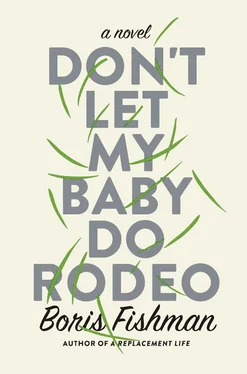When Alex and Maya met, Maya was indifferent toward children. When she happened upon one, she spoke to him like an inattentive adult. In a woman like her, even displaced to America, the alarm should have beat sooner than in an American body — but it didn’t. When children came up, she started clearing the table and made fun: Alex, should we have five? Or six? The elder Rubins loved making fun; it meant everyone was in a good mood. Maya also made a different kind of joke: “Running my cash register with one hand, turning over grechanniki with the other, and holding the little one with a third?” Like a sputtering engine, the Rubins’ laughter caught in their throats. If Maya had to work all hours in a café, of course Raisa would look after the child. But — that idea had not gone out of Maya?
Had Maya wished childlessness on them? Now, no child possible, she had the time to open a café—a chain of cafés. That was the bitter irony for the Rubins. For Maya, the bitter irony was that now she could not. That obsession had belonged to another woman; every obsession withers if you just hold down the obsessive, she thought. She laughed at the way she had dramatized her youthful situation — could her fantasy, to cook in some café, have been any paltrier? Now, Maya would not know how to run a café if the keys were handed to her. That devil she had spoken to Alex about ten years before — he had abandoned her. Her devil giving up; the passage of time; the female clock; Moira at the hospital with her stories of Ricky and Anthony and the dean’s list; also, the maternity ward was just a floor down from mammography — who knew why, but the desire for a café had been replaced by a desire for children. But the Rubins refused to consider adoption. It’s not that they didn’t love losing. There was a sweet surrender in it. But the loss had to be clean.
Because Maya was the interloper among them; because America had brought her to the Rubins; because she worked in medicine and occasionally expressed a contrasting opinion — the duty of persuading the Rubins to adopt fell to her, even as her own reluctance remained. The amount of time that infertile couples spend on fertility treatments — luckily and unluckily, this was not necessary in the case of the Rubins — Maya spent instead on persuading the family out of its hostility to adoption. The Rubins would not even rent a local apartment when they went to the Mexican coast — used beds and sheets made them feel unhygienic and poor, even if a hotel performed the same changeovers — and she wanted them to take on a used human being? No. Heads shook. No, Mayechka, no. And so the name Rubin will come to an end? she asked, hitting them in a tender spot. It’s already ended, Eugene sighed, and then said that it was his and Raisa’s fault; they should have had more children. At which point Alex removed himself from the table, and the dinner went on in a spectral silence.
Maya stopped making her case — the appealed-to must want the appeal. Then, during one dinner, apropos of nothing, Raisa mounted another attack on adoption. She conceded that it was a fine and honorable thing to do, to give a homeless child a home and all that, and perhaps she was not only backward but obsolete to remain opposed, but she could not bring herself around. She was too old, too set. Her sin, but not one she could overcome. It was then that Maya understood that despite the show they had been giving her, they would all sign on — but only if she took on the responsibility. And so she said: “We’re adopting.” She was right: They all shrugged, including Alex. They were good parents-in-law, a good husband: They would give their beloved, capricious Maya what she wanted. Everything they endured over the next two years — nine months, morning sickness, and painful labor were a favor from God by comparison — they endured for her.
They chose the adoption agency from the Yellow Pages, like a tailor. Independent Adoption Services had retenanted a former department store; the space, contrived to hold circular clothing racks, rows of registers, and banks of mirrors, was overlarge and overexposed for the more delicate task of finding new homes for children, and every time Maya attempted to navigate its fluorescent cubicles and cream-colored hallways, she ended up at bathrooms for the handicapped. It wasn’t until she strode the halls of IAS that Maya understood what people meant by auras and magnetic fields. She felt like a dog responding to an unseen but undeniable scent. It was bad.
In the waiting area, portraits of successfully placed children and their new parents, usually on the steps of the courthouse where the transfer had been blessed by the law, faced off against childless couples that aspired to migrate to the opposite wall. Maya, Alex, and their sad compatriots studied the wall of success; the pregnant women who came in, Maya observing them like the other party in a car accident, studied the Mayas and Alexes. Maya was shocked the first time she saw a pregnant woman walk in, then chastised herself for her thickness; of course, the agency would serve both sides. The effortlessly full-bellied women read the prospective-parent profiles like personal ads, savoring a power that, by their looks, they had rarely, if ever, enjoyed. She hated them because they held the power, and she hated them because they were pregnant. Feeling a modest hysteria, Maya would snatch a palmful of cookies from the center console that held the uneasy peace between the parents-already and the parents-they-wish and gnash them mindlessly, hating herself as she did it. Generally, though, she directed the anger that pooled in her throat at the agency staff, which treated women who wanted to give up their children like wounded angels, and people who wanted to turn their lives upside down to make room for a foreign child like criminals until proven otherwise. (“It’s social engineering, only legal,” Mishkin, the adoption supervisor, had noted. “You Russians should know something about that.”) If Mishkin had not accosted the Rubins one afternoon, trying on them the smattering of mangled Russian in his possession — he had overheard them whispering — quite possibly they would have remained childless. The slab-faced matron to whom they had initially been assigned had been terrorizing them into confessing their unpreparedness, unwillingness, doubt.
Slab-Face could have been forty or seventy. Did the Rubins own guns? Fire extinguishers? Were the outlets sealed? Her red pen hovered over a clipboard. Maya and Alex exchanged looks: Was she joking? Slab-Face barreled on: Where had they lived? Every state would need a background check. They hadn’t crossed the river to live in New York, had they? Because New York was the worst.
The Rubins, she went on, would have to produce a self-advertisement like the ones in the waiting area. “Think of it like a newspaper personal,” Slab-Face advised. “You want to go steady with the birth parents — what can you offer?” Spotting the Rubins’ unease, she raised her chin: “Oh, yes. You have to.”
“How did you. . become involved with adoptions?” Alex mustered. He coughed lightly.
“I’ve got two little ones,” Slab-Face whipped out a photograph of two bantam-sized brown children flanking her abundance as all three roared behind the seat rail of a roller coaster.
“It is possible to adopt at all ages?” Alex said, and Maya stared at him with mortification. “He means the children’s ages,” she rushed to add.
Perhaps Slab-Face would have been willing to forgo a personal verification of the Rubins’ claims regarding firearms and ammunition, but comments like these, on steady supply from Alex, guaranteed otherwise. She arrived on a rainy afternoon wearing the same housedress in which they had found her at the office and proceeded to test the edges of their countertops, flick their stove burners, measure the height of their steps. The Rubins remained glumly seated at the kitchen table. They had refused to allow Eugene anywhere near the house during Slab-Face’s inspection for fear he would insult her so gravely that he would sully their chances forever. Maya experienced a great gratitude to her husband for saying nothing about what she had dragged the pair of them into. Also for not mentioning the duration and cost of the adoption — a year and around twenty thousand dollars, “depending on what the birth parents want.” “What do you mean, what the birth parents want?” Alex asked, thinking of Soviet bribes. “They’ll tell you that at orientation,” Slab-Face said, reluctantly marking Home Inspection Pass rather than Fail on the clipboard.
Читать дальше












